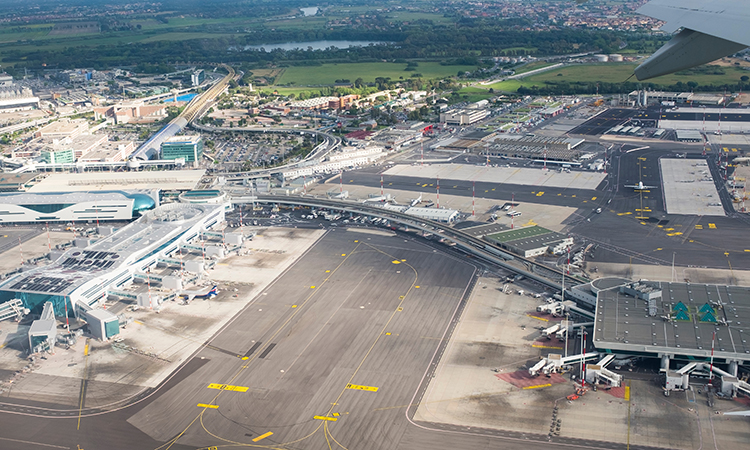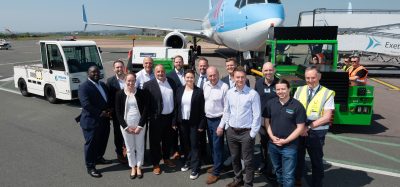Rome’s Fiumicino and Ciampino Airports achieve Level 4+ in ACI carbon programme
- Like
- Digg
- Del
- Tumblr
- VKontakte
- Buffer
- Love This
- Odnoklassniki
- Meneame
- Blogger
- Amazon
- Yahoo Mail
- Gmail
- AOL
- Newsvine
- HackerNews
- Evernote
- MySpace
- Mail.ru
- Viadeo
- Line
- Comments
- Yummly
- SMS
- Viber
- Telegram
- Subscribe
- Skype
- Facebook Messenger
- Kakao
- LiveJournal
- Yammer
- Edgar
- Fintel
- Mix
- Instapaper
- Copy Link
Posted: 13 April 2021 | International Airport Review | No comments yet
Rome–Fiumicino and Rome–Ciampino have become the first European airports to achieve the highest level in ACI’s Airport Carbon Accreditation programme.


Aeroporti di Roma (ADR), the operator of Rome–Fiumicino International Airport (FCO) and Rome–Ciampino International Airport (CIA), has achieved the highest level of the Airports Council International (ACI) Airport Carbon Accreditation (ACA) programme, Level 4+ “Transition”, making the two airports the first in Europe to do so.
To achieve this recognition, airports are required to:
- Reduce their CO2 emissions in line with global climate goals
- Influence other parties active within the airport site to achieve effective reduction
- Compensate for their residual emissions with reliable carbon credits.
Only two other airports in the world have achieved this level of carbon management performance so far: Dallas Fort Worth International Airport (DFW) in the U.S. and Indira Gandhi International Airport (DEL) in India, while Christchurch International Airport (CHC) has reached Level 4 “Transformation”.
Since 2011, after obtaining the first Airport Carbon Accreditation certification, Aeroporti di Roma has continuously reduced carbon emissions under its control and driven broader reductions within the airport system through an engagement plan involving all stakeholders. Fiumicino Airport has been a carbon neutral airport since 2013, and was joined shortly thereafter by Ciampino Airport.
In order to accelerate their progress to reach the objectives of the Paris Agreement and achieve Level 4+, Aeroporti di Roma has set out a plan to eliminate all of its own CO2 emissions and thus achieve net zero CO2 emissions by 2030. This ambitious target, when achieved, will set the airports 20 years ahead of the curve on the global climate neutrality objectives.
“This noteworthy recognition testifies to our strong commitment to environmental issues and to our willingness to continue tenaciously on this path, convinced of the need to increasingly integrate sustainability and innovation into our core business,” said the CEO of Aeroporti di Roma, Marco Troncone.
He added: “In view of the carbon-intensive nature of the aviation sector and to preserve the connectivity of the future, ADR’s strategy is oriented towards the rapid decarbonisation of the airports it manages. In fact, we are aiming to reach zero CO2 emissions by 2030, long in advance of the European references for the sector, with a plan mainly aimed at renewable sources and electric mobility.”
Aeroporti di Roma specifically contributes to the reduction of the overall emissions of the various stakeholders operating at the airport by:
- Working to make Sustainable Aviation Fuel (SAF) available to airlines by 2024
- Promoting electric mobility at the airport, with the installation of 500 charging stations for electric vehicles and completely renewing its own fleet
- Building large photovoltaic plants at the airport for a total capacity of 60 MW
- Joining the EP-100 of The Climate Group’s global initiative on the smarter use of energy.
Olivier Jankovec, Director General of Airports Council International (ACI) Europe, said: “We are absolutely thrilled with Aeroporti di Roma’s excellent achievement! When launching the new levels of Airport Carbon Accreditation in 2020, amid the direst of crises ever witnessed by the aviation sector, we were propelling an industry-wide ambition that was suddenly stripped of the vital resources to fulfil it. Decarbonisation is an especially costly endeavour for businesses in the so-called ‘hard-to-abate’ sectors, of which aviation is a prime example. Moving past these challenges and reaching the highest level of Airport Carbon Accreditation at this time is an exceptional achievement on the part of Rome Airports. I would like to wholeheartedly congratulate and thank each person involved in this success.”
He added: “The track record of our members, and our industry, illustrates that we lead the way in airport decarbonisation worldwide. Through the ongoing ambition of our Airport Carbon Accreditation programme, further enhanced through the introduction of two new accreditation levels; our close involvement in the European aviation sector’s recent Destination 2050 roadmap; and our call for the European Union (EU) to join us in a Pact for Sustainable Aviation in 2021, we continue to strive towards our climate goals in tangible and actionable ways. Our ambition remains undimmed.”
Related topics
Airport Carbon Accreditation (ACA), Airside operations, Emissions, Machinery, Sustainability, Sustainable Aviation Fuel (SAF), Sustainable development, Terminal operations
Related airports
Rome Ciampino-G. B. Pastine International Airport (CIA), Rome Fiumicino International Airport (FCO)
Related organisations
Aeroporti di Roma (ADR), Airports Council International Europe (ACI Europe)


















